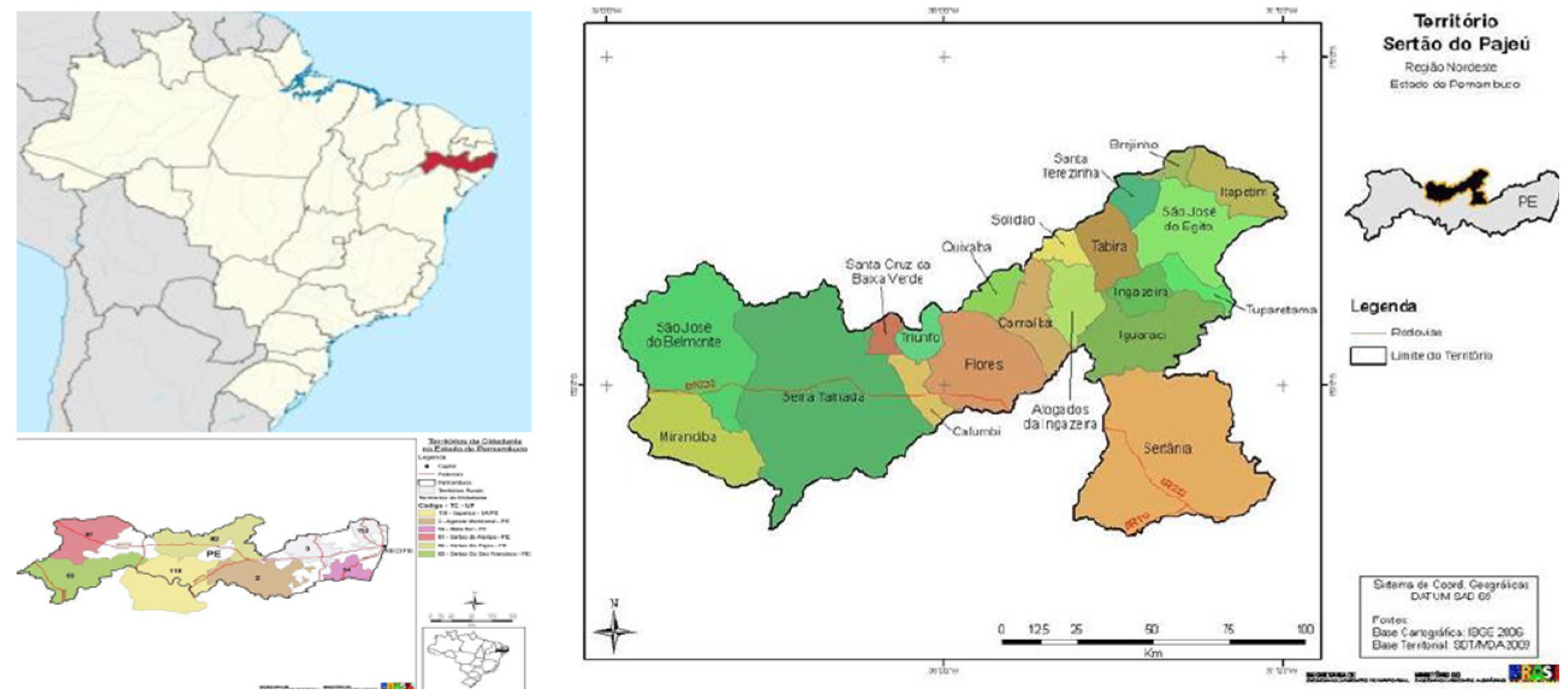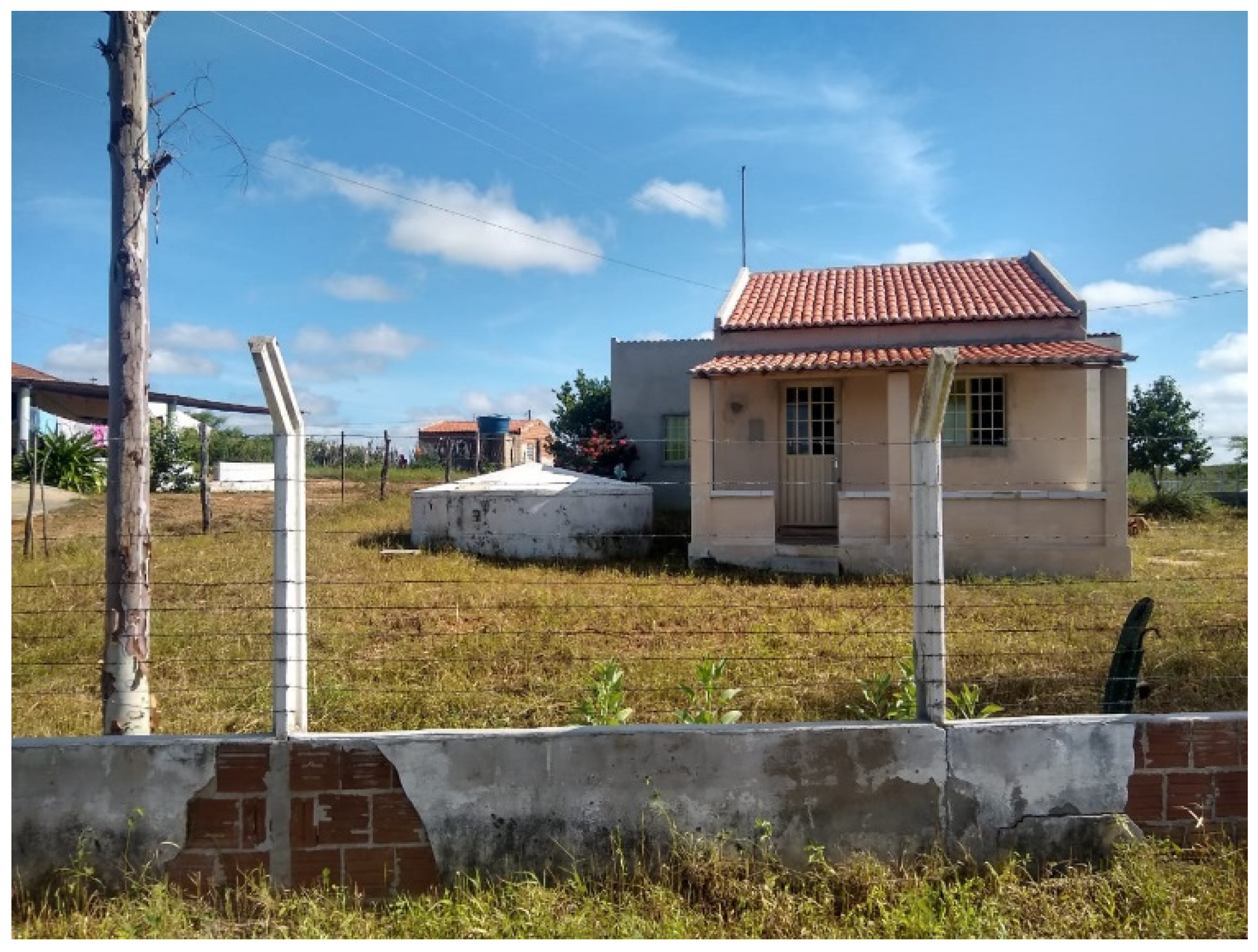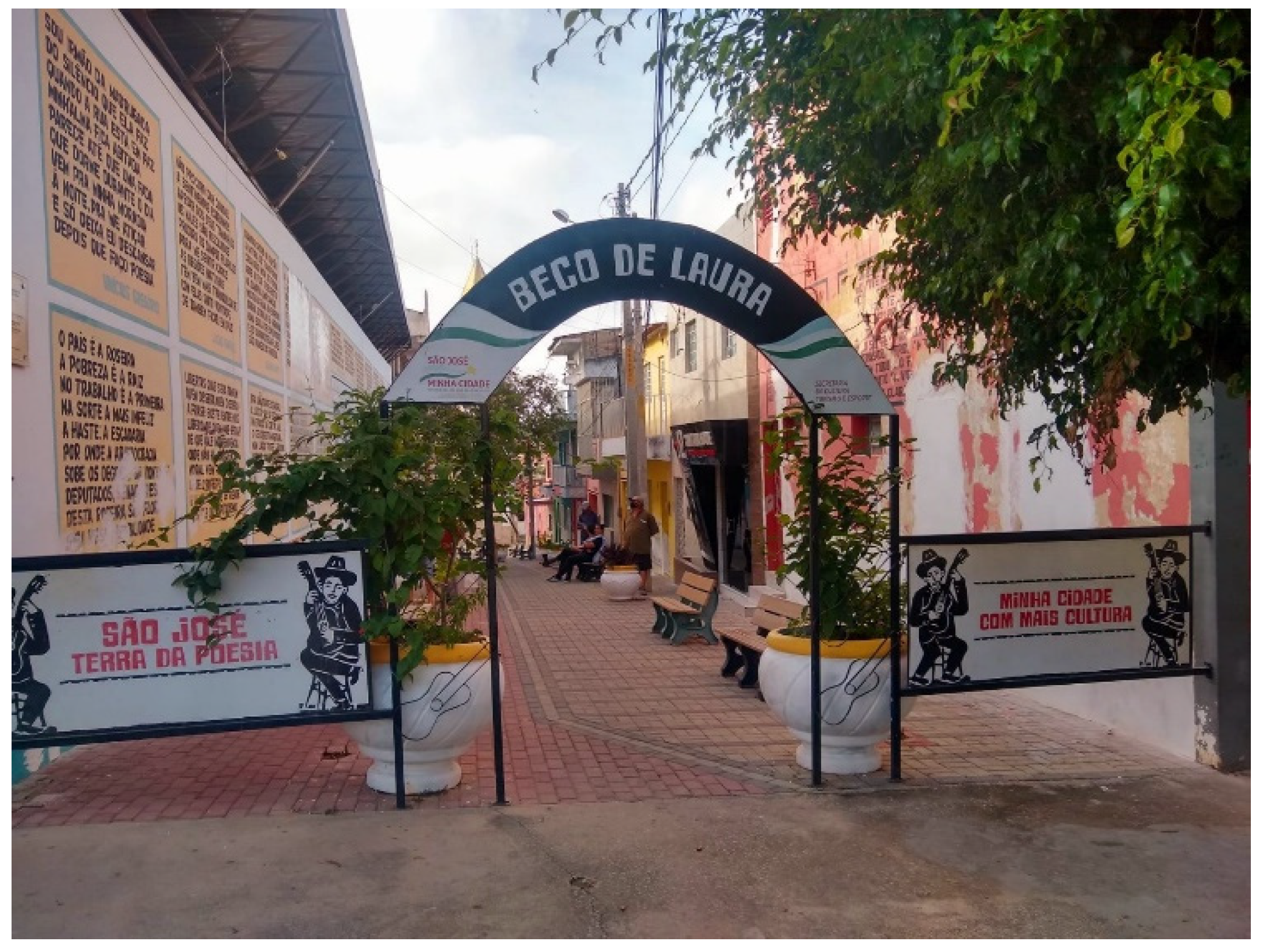“Good Morning, Poet, How Are You?” Peasant Poetry and Its Vitality in Sertão do Pajeú (Brazil)
Abstract
:1. Introduction
2. Materials and Methods
3. Results
3.1. “Sertão do Pajeú”
3.2. The Vitality of Peasant Poetry in Sertão do Pajeú
- Aqui nessa região
- O sertanejo persiste
- Pois tem a variação
- Do inverno que existe
- Se tem lucro, é verso alegre
- Se tem perda, é verso triste.
- Here in this region
- The sertanejo persists
- Well, there is variation
- Of the winter that exists
- If it makes a profit, it’s a happy verse
- If there is loss, it is a sad verse.
- Essa palavra ciência
- Deus a mim não concedeu
- A minha mão não escreve
- Minha boca nunca leu
- Mas vivo estudando os livros
- Que a natureza me deu
- That word science
- God has not given me
- My hand does not write
- My mouth never read
- But I live studying the books
- That nature gave me
- Quando tinha a floresta colorida
- Toda noite se via os pirilampos
- Borboletas dançavam pelos campos
- Num desfile de amor em prol da vida
- Hoje em dia a floresta está despida
- Acabou-se a beleza do sertão
- Mesmo assim com a falta de água e pão
- Natureza não tem culpa de nada
- A cigarra só canta sufocada
- Pela forte quentura do verão.
- When there was a colorful forest
- Every night you saw the fireflies
- Butterflies danced across the fields
- In a parade of love for life
- Nowadays the forest is bare
- The beauty of the hinterland is over
- Even so with the lack of water and bread
- Nature is not to blame
- The cicada only sings suffocated
- Because of the hot summer heat.
- Sem a água e o pão de cada dia
- Tem razão da pobreza estar tristonha
- O carão canta à noite quando sonha
- Recordando o sertão quando chovia
- Morre a tarde e a terra não esfria
- Que a quentura do Sol fica no chão
- Um boi magro se coça num mourão
- Se furando nas pontas da ossada
- A cigarra só canta sufocada
- Pela forte quentura do verão.
- Without water and daily bread
- Poverty is right to be sad
- The big guy sings at night when he dreams
- Remembering the sertão when it rained
- The afternoon dies and the earth does not cool down
- That the heat of the sun remains on the ground
- A skinny ox scratches itself on a post
- Drilling into the ends of the bone
- The cicada only sings suffocated
- Because of the hot summer heat.
- Ao visitar meu sertão
- Achei tudo diferente
- Sem plantação de lavoura
- Sem chuva na terra quente
- Sem ter pastagem na serra
- O gado é magro e doente
- When visiting my “sertão”
- I found everything different
- No crop plantation
- No rain in the hot land
- Without having pasture in the mountains
- The cattle are thin and sick
- Sei que a água da chuva é incolor
- Mas às vezes do alto quando pinga
- Faz implante na pele da Caatinga
- E o semblante daqui muda de cor.
- A batata de umbu não é tambor
- Mas se enche de água sob o chão,
- E é a chuva quem faz decoração
- De veludo no caule da urtiga.
- A adutora de Deus é quem irriga
- O canteiro de sonhos do Sertão!
- I know that rainwater is colorless
- But sometimes from above when it drips
- Implants in the skin of the Caatinga
- And the face here changes color.
- The umbu potato is not a drum
- But it fills with water under the ground,
- And it’s the rain that decorates
- Velvet on nettle stem.
- God’s pipeline is the one irrigating
- The Sertão’s dream bed!
- Eu não sou professor de poesia
- Agricultura é a minha profissão
- Na qual vivo passando privação
- No trabalho pesado todo dia
- Nesta tal profissão sem garantia
- Não se dá o valor ao brasileiro
- Deve ter proteção o cavalheiro
- Que é manso, trabalha e faz fartura
- Pois se ele abandona a agricultura
- Se acaba de fome o mundo inteiro.
- I’m not a poetry teacher
- Agriculture is my profession
- In which I live experiencing deprivation
- In hard work every day
- In this profession without guarantee
- Brazilians are not appreciated
- The gentleman must have protection
- Who is meek, works and makes plenty
- For if he abandons agriculture
- The whole world ends up starving.
- O sertão não presta mais
- E ele vêi ficar ruim
- Depois que o home deu fim
- À mata e aos animais
- O chão foi ficando inchuto
- E a terra negando fruto
- E o povo passando fome
- Quem destruiu a beleza
- Não deu fé que a natureza
- Tá se vingando do home.
- The wilderness no longer serves
- And he saw it get bad
- After the man ended
- To the forest and the animals
- The floor was swollen
- And the earth withholding fruit
- And the people starving
- Who destroyed the beauty
- Didn’t give faith that nature
- It’s taking revenge on the human.
4. Discussion
Peasant Poetry, Popular Education and Agroecology
5. Conclusions
Author Contributions
Funding
Institutional Review Board Statement
Informed Consent Statement
Data Availability Statement
Conflicts of Interest
References
- Ruiz, J.C. Carta de Baeza Sobre Patrimonio Agrário; Universidad Internacional de Andalucía: Sevilla, Spain, 2013. [Google Scholar]
- Sosa, M.E.E.; Sosa, C.M.E.; Saínz, M.A. La oralidad, patrimonio inmaterial del campesino en la zona de Cartagena. Rev. Caribeña Cienc. Soc. 2018. Available online: https://ideas.repec.org/a/erv/rccsrc/y2018i2018-1071.html (accessed on 10 January 2023).
- Echevarria, J.U. Tipos y Cuadros de Costumbres en la Poesía Popular del Siglo XIX; Pineda Libros: Santiago, Chile, 1973. [Google Scholar]
- Jiménez de Báez, Y. La fiesta de la “topada” y la migración al Norte. (Una tradición de la Sierra Gorda mexicana y de áreas circunvecinas). Rev. Lit. Pop. 2008, 2, 347–375. [Google Scholar]
- Trapero, M. El arte de la Improvisación Poética: Estado de la Cuestión; Fundación Joaquín Díaz u Junta de Castilla y León: Valladolid, Spain, 2008; pp. 6–33. [Google Scholar]
- Garzia, J. History of Improvised Bertsolaritza: A Proposal. Oral Tradit. 2007, 22, 77–115. [Google Scholar] [CrossRef]
- Garzia, J. El bertsolarismo. In Realidad, Investigación y Futuro de la Improvisación Oral Vasca; Fundación Joaquín Díaz u Junta de Castilla y León: Valladolid, Spain, 2008. [Google Scholar]
- Finnegan, R. Oral Literature in Africa; Open Book Publishers: Cambridge, UK, 2012. [Google Scholar]
- Saltchuk, J.M.M. Poetic Improvisation in the Brazilian Northeast. Vibrant–Virtual Braz. Anthropol. 2011, 8, 1. Available online: https://www.scielo.br/j/vb/a/B65KLWkRCVP9kpNXRJCqp5D/?lang=en (accessed on 30 March 2023).
- Yashina, T.A. Peasant Theme in the Creative Work of Robert Burns and Its Coverage in Soviet Literary Studies; EntreLínguas: Araraquara, Brazil, 2021. [Google Scholar]
- Goodridge, J. Rural Life in English Poetry of the Mid-Eighteenth Century. Ph.D. Thesis, University of Newcastle, Callaghan, Australia, September 1990. [Google Scholar]
- Waysband, E. Between Essentialism and Constructivism: Maksim Gor’kii and Vladislav Khodasevich on Russian Neo-peasant Poetry; SEEJ: St. Petersburg, Russia, 2018; Volume 62, pp. 663–684. [Google Scholar]
- Kuismin, A. Ploughing with the Pen. Metapoetic Elements in Finnish Nineteenth-Century Peasant Poetry. In Reading and Writing from Below Exploring the Margins of Modernity; Ann-Catrine Edlund, T.G., Ashplant, A.K., Eds.; Umeå University and Royal Skyttean Society: Umeå, Sweden, 2016. [Google Scholar]
- Pilot, M. “The broken silence of generations”: Twentieth-century Inheritors of Peasant Culture. Tekstualia 2013, 1, 279–288. [Google Scholar] [CrossRef]
- Gelaye, G. Peasant Poetics and State Discourse in Ethiopia: Amharic Oral Poetry as a Response to the 1996–97 Land Redistribution Policy. Northeast. Afr. Stud. 1999, 6, 171–206. [Google Scholar] [CrossRef]
- Martínez-Torres, E.M.; Rosset, P.M. Diálogo de saberes in La Vía Campesina: Food sovereignty and agroecology. J. Peasant. Stud. 2014, 41, 979–997. [Google Scholar] [CrossRef]
- Gallar-Hernández, D. Forging Political Cadres for Re-Peasantization: Escuela de Acción Campesina (Spain). Sustainability 2021, 13, 4061. [Google Scholar] [CrossRef]
- Cancllni, N.G. Culturas Híbridas: Estrategias Para Entrar y Salir de la Modernidad; Grijalbo: Mexico City, Mexico, 1989. [Google Scholar]
- Storey, J. Teoría Cultural y Cultura Popular; Octaedro: Barcelona, Spain, 2002. [Google Scholar]
- Sevilla, E. De la Sociología Rural a la Agroecología; Icaria: Barcelona, Spain, 2006. [Google Scholar]
- Villas Bôas, R.L. Novo ciclo de modernização conservadora: Indústria cultural e reconfiguração da Hegemonia. Rebela v. 1, n. 3, fev. 2012.
- Chayanov, A.V. La Organización de la Unidad Económica Campesina; Nuevas Visión: Buenos Aires, Argentina, 1974. [Google Scholar]
- Ploeg, J.D. van der. Nuevos Campesinos: Campesinos e Imperios Alimentarios; Icaria: Barcelona, Spain, 2010. [Google Scholar]
- Wolf, E. Los Campesinos; Editorial Labor: Barcelona, Spain, 1971. [Google Scholar]
- Sevilla, E. Desde el pensamiento social agrário; UCO: Córdoba, Spain, 2006. [Google Scholar]
- Silva, R.M.A. Entre dois paradigmas: Combate à seca e convivência com o Semiárido. Soc. Estado 2003, 18, 361–385. [Google Scholar] [CrossRef] [Green Version]
- Rosset, P.; Val, V.; Barbosa, L.P.; Mccune, N. Agroecology and La Via Campesina II. Peasant agroecology schools and the formation of a sociohistorical and political subject. Agroecol. Sustain. Food Syst. 2019, 43, 895–914. [Google Scholar] [CrossRef]
- Rivera-Ferre, M.G.; Gallar, D.; Calle-Collado, A.; Pimentel, V. Agroecological education for food sovereignty: Insights from formal and non-formal spheres in Brazil and Spain. J. Rural. Stud. 2021, 88, 138–148. [Google Scholar] [CrossRef]
- Mccune, N.; Rosset, P.N.; Salazar, T.C.; Morales, H.; Moreno, A.S. The Long Road: Rural Youth, Farming and Agroecological Formación in Central America. Mind Cult. Act. 2017, 24, 183–198. [Google Scholar] [CrossRef]
- Meek, D. Learning as territoriality: The political ecology of education in the Brazilian landless workers’ movement. J. Peasant. Stud. 2015, 42, 1179–1200. [Google Scholar] [CrossRef]
- Meek, D.; Bradley, K.; Ferguson, B.; Hoey, L.; Morales, H.; Rosset, P.; Tarlau, R. Food sovereignty education across the Ame-ricas: Multiple origins, converging movements. In Critical Adult Education in Food Movements; Springer Nature: Cham, Switzerland, 2022; pp. 91–106. [Google Scholar]
- Meek, D.; Tarlau, R. Critical Food Systems Education (CFSE): Educating for food sovereignty. Agroecol. Sustain. Food Syst. 2015, 40, 237–260. [Google Scholar] [CrossRef]
- Barbosa, L.P. Educação do Campo [Education for and by the countryside] as a political project in the context of the struggle for land in Brazil. J. Peasent Stud. 2016, 44, 118–143. [Google Scholar] [CrossRef]
- Mccune, N.; Sánchez, M. Teaching the territory: Agroecological pedagogy and popular movements. In Critical Adult Education in Food Movements; Springer Nature: Cham, Switzerland, 2022; pp. 75–90. [Google Scholar] [CrossRef]
- Petersen, P.; Silveira, L.M.; Gabriel, B.F.; Silvio, G.A. Método de Análise Econômico-Ecológica de Agroecossistemas, 1st ed.; AS-PTA: Rio de Janeiro, Brazil, 2017. [Google Scholar]
- Ministério Do Desenvolvimento Agrário–Mda. Sistema de Informações Territoriais SIT/MDA; MDA-SDT: Brasília, Brazil, 2004. [Google Scholar]
- Instituto Brasileiro de Geografia E Estatística–Ibge. Censo Agropecuário 2017–Resultados Definitivos; Rio de Janeiro, Brazil, 2019. Available online: https://biblioteca.ibge.gov.br/index.php/biblioteca-catalogo?view=detalhes&id=73096. (accessed on 30 March 2023).
- Andrade, M.C. A Terra e o Homem no Nordeste: Contribuição ao Estudo da Questão Agrária no Nordeste, 8th ed.; Cortez: São Paulo, Brazil, 2011. [Google Scholar]
- Toledo, V.M. La racionalidad ecológica de la producción campesina. In Ecología, Campesinado e Historia; La Piqueta, 1993; Volume 5, pp. 197–218. Available online: https://www.researchgate.net/publication/322136859_La_Racionalidad_Ecologica_de_la_Produccion_Campesina_Victor_M_Toledo-Universidad_Nacional_de_Mexico (accessed on 30 March 2023).
- Jalil, L.M. As Flores e os Frutos da luta: O Significado da Organização e da Participação Política Para as Mulheres Trabalhadoras Rurais. Tese de Doutorado; Universidade Federal Rural do Rio de Janeiro: Rio de Janeiro, Brazil, 2013. [Google Scholar]
- Santos, G.G. As Mulheres na Política e a Política na Vida das Mulheres: Olhares Sobre a ATER Mulher no Sertão do Pajeú-PE; Dissertação de Mestrado, Universidade Federal Rural de Pernambuco: Recife, Brazil, 2017. [Google Scholar]
- Romero, S. Estudos Sobre a Poesia Popular do Brasil; Typ. Laemmert & C: Rio de Janeiro, Brazil, 1888. [Google Scholar]
- Soler, L. As Raízes Árabes, Tradição Poético-Musical do Sertão Nordestino; Editora Universitária: Recife, Brazil, 1978. [Google Scholar]
- Cascudo, L.C. Vaqueiros e Cantadores; Global: São Paulo, Brazil, 2005. [Google Scholar]
- Ministério Da Cultura–Instituto do Patrimônio Histórico e Artístico Nacional–IPHAN–Centro Nacional de Folclore e Cultura Popular–CNFCP. Dossiê de Registro Literatura de Cordel. 2018. Available online: http://portal.iphan.gov.br/uploads/ckfinder/arquivos/Dossie_Descritivo(1).pdf (accessed on 30 March 2023).
- Steil, C.A.; Carvalho, I.C.M. Epistemologias ecológicas: Delimitando um conceito. Mana Estud. Antropol. Soc. 2014, 20, 163–183. [Google Scholar] [CrossRef] [Green Version]
- Cascudo, L.C. Literatura Oral no Brasil; Global: São Paulo, Brazil, 2006. [Google Scholar]
- Lira, G.V. Pajeú: O Rio Encosta As Margens/No Eco de Nossa Voz; Dissertação de Mestrado, Universidade Federal de Pernambuco: Recife, Brazil, 2020. [Google Scholar]
- Lima, A.J. Legado Filosófico de Poetas e Repentistas Semianalfabetos; Bagaço: Recife, Brazil, 2018. [Google Scholar]
- Nordeste sertanejo: A região semi-árida mais povoada do mundo. Estud. Avançados 1999, 13, 60–68. [CrossRef] [Green Version]
- Toledo, V.T.; Barrera-Bassols, N. La Memoria Biocultural: La Importância Ecológica de Las Sabidurias Tradicionales; Icaria: Barcelona, Spain, 2008. [Google Scholar]
- Halbwachs, M. A Memória Coletiva, 2nd ed.; Centauro: São Paulo, Brazil, 2013. [Google Scholar]
- Araújo, P.C.A. A Cultura Dos Cordéis: Território(s) de Tessitura de Saberes; TESE de Doutorado, Universidade Federal da Paraíba: João Pessoa, Brazil, 2007. [Google Scholar]
- Pennesi, K.; Souza, C.R.B. O encontro anual dos profetas da chuva em Quixadá, Ceará: A circulação de discursos na invenção de uma tradição. Horiz. Antropológicos 2012, 18, 159–186. [Google Scholar] [CrossRef] [Green Version]
- Menezez, M.F. As Curvas do Meu Caminho; Editora e Gráfica Franciscana: Petrolina, Brazil, 2004. [Google Scholar]
- Campos, L.; Gregório, V. Cartilha de Poesia Popular: Teoria e Prática, Aula Por Aula (Cartilha do Professor), 1st ed.; Israel Maria dos Santos (Prefixo Editorial: 917119): São José do Egito, Brazil, 2019. [Google Scholar]
- Bastião, L. Minha Herança de Matuto, 1st ed.; Grupo Claudino: Teresina, Brazil, 2018. [Google Scholar]
- Instituto Brasileiro De Geografia E Estatística–Ibge. Censo Agropecuário 2006–Agricultura Familiar: Primeiros Resultados; Rio de Janeiro, Brazil, 2006. Available online: https://biblioteca.ibge.gov.br/index.php/biblioteca-catalogo?id=750&view=detalhes. (accessed on 30 March 2023).
- Rody, T.; Telles, L. Caderneta Agroecológica: O Saber e o Fazer Das Mulheres do Campo, Das Florestas e Das Águas; Editora Asa Pequena: Viçosa, Brazil, 2021. [Google Scholar]
- Giraldo, O.F. Multitudes Agroecológicas; UNAM: Mexico City, Mexico, 2022. [Google Scholar]
- Cacho, M.M.T.G.; Giraldo, O.F.; Aldasoro, M.; Morales, H.; Ferguson, B.G.; Rosset, P.; Khadse, A.; Campos, C. Bringing Agroecology to Scale: Key Drivers and Emblematic Cases. Agroecol. Sustain. Food Syst. 2018, 42, 637–665. [Google Scholar] [CrossRef]
- Rosset, P.M.; Barbosa, L.P.; Val, V.; Mccune, N. Critical Latin American Agroecology as a Regionalism from Below. Globalizations 2022, 19, 635–652. [Google Scholar] [CrossRef]
- Giraldo, O.F.; Rosset, P.M. Emancipatory agroecologies: Social and political principles. J. Peasant. Stud. 2022, 1–31. [Google Scholar] [CrossRef]
- Borras, S.M., Jr.; Scoones, I.; Baviskar, A.; Edelman, M.; Peluso, N.L.; Wolford, W. Climate change and agrarian struggles: An invitation to contribute to a JPS Forum. J. Peasant. Stud. 2022, 49, 1–28. [Google Scholar] [CrossRef]
- Silva, M.G. Educação popular e experiências educativas em Agroecologia. Rev. Educ. Pop. 2022, 21, 265–285. [Google Scholar] [CrossRef]
- Goris, M.; van den Berg, L.; Lopes, I.S.; Behagel, J.; Verschoor, G.; Turnhout, E. Resignification Practices of Youth in Zona da Mata, Brazil in the Transition Toward Agroecology. Sustainability 2019, 11, 197. [Google Scholar] [CrossRef] [Green Version]
- Calvário, R.; Desmarais, A.A. The feminist dimensions of food sovereignty: Insights from La Via Campesina’s politics. J. Peasant. Stud. 2023, 1–25. [Google Scholar] [CrossRef]
- Martignoni, J.B.; Claeys, P. No Food Sovereignty Without Feminism? Negotiating Gender Equality in the UN-DROP. In The United Nations’ Declaration on Peasants’ Rights; Alabrese, M., Bessa, A., Brunori, M., Giuggioli, P.F., Eds.; Routledge: London, UK, 2022; pp. 47–61. [Google Scholar]
- Altieri, M.A.; Nicholls, C. Por qué estudiar la agricultura tradicional? Agroecol. Desarro. 1991, 1, 1. Available online: https://www.scienceopen.com/document?vid=3e35597c-6edd-4d89-8327-2015fd1e9a5e. (accessed on 30 March 2023).
- Toledo, V.M. Agroecology and spirituality: Reflections about an unrecognized link. Agroecol. Sustain. Food Syst. 2022, 46, 626–641. [Google Scholar] [CrossRef]






Disclaimer/Publisher’s Note: The statements, opinions and data contained in all publications are solely those of the individual author(s) and contributor(s) and not of MDPI and/or the editor(s). MDPI and/or the editor(s) disclaim responsibility for any injury to people or property resulting from any ideas, methods, instructions or products referred to in the content. |
© 2023 by the authors. Licensee MDPI, Basel, Switzerland. This article is an open access article distributed under the terms and conditions of the Creative Commons Attribution (CC BY) license (https://creativecommons.org/licenses/by/4.0/).
Share and Cite
Cabral, C.d.M.; Gallar-Hernández, D. “Good Morning, Poet, How Are You?” Peasant Poetry and Its Vitality in Sertão do Pajeú (Brazil). Sustainability 2023, 15, 6461. https://doi.org/10.3390/su15086461
Cabral CdM, Gallar-Hernández D. “Good Morning, Poet, How Are You?” Peasant Poetry and Its Vitality in Sertão do Pajeú (Brazil). Sustainability. 2023; 15(8):6461. https://doi.org/10.3390/su15086461
Chicago/Turabian StyleCabral, Caio de Meneses, and David Gallar-Hernández. 2023. "“Good Morning, Poet, How Are You?” Peasant Poetry and Its Vitality in Sertão do Pajeú (Brazil)" Sustainability 15, no. 8: 6461. https://doi.org/10.3390/su15086461
APA StyleCabral, C. d. M., & Gallar-Hernández, D. (2023). “Good Morning, Poet, How Are You?” Peasant Poetry and Its Vitality in Sertão do Pajeú (Brazil). Sustainability, 15(8), 6461. https://doi.org/10.3390/su15086461








